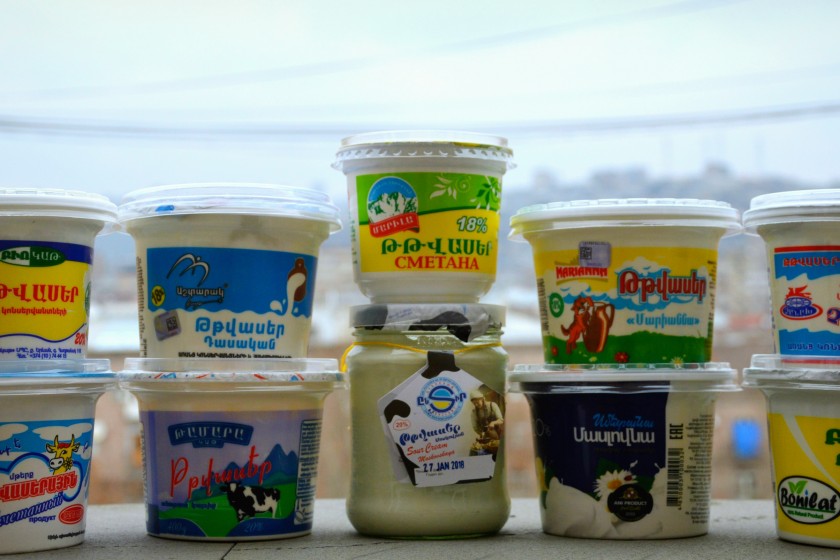
Armenia’s Local Sour Creams: Out of Ten Samples Tested, Only Three Passed Inspection
Tatev Khachatryan
Testing reveals troubling findings in dietary staple
In January this year, Hetq sent ten sour cream samples of ten Armenian manufacturers for testing, and only three of them passed inspection in terms of health risk.
The other seven were found to contain Escherichia coli bacteria, antibiotics, vegetable oil and higher than acceptable levels of yeast.
Sour cream is widely used in Armenian households, both separately and as a cooking ingredient.
There are several decisions and legal acts regulating the safety of dairy products in Armenia.
RA Government Decision N 1925 on Milk, Dairy Products and Their Production of December 21, 2006, states that at the end of the storage period (6-10days) the lactic acid bacteria in the sour cream should be not less than 107 CFU/g.
The use of vegetable oil in the production of sour cream is prohibited: it is not easily digested by the human body. However, some producers use it since it’s cheaper. In that case, they must indicate it on the label.
A EAC (Eurasian Conformity) label is necessary for the sale of goods within the Eurasian Economic Union (EAEU), particularly important in case of high-risk food. According to another decision by the Armenian government, dairy products are high-risk food. (Armenia is an EAEU member)
Yerevan’s Standard Dialog LLC Laboratory did the testing. None of the sour creams had passed its expiration date.

SAMPLE N1
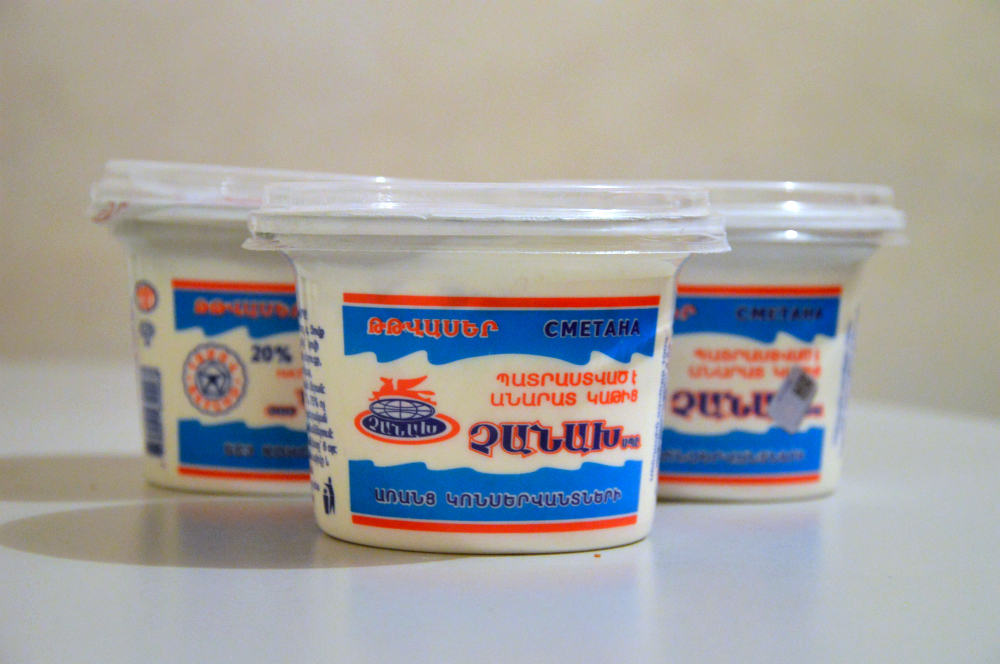
Chanakh company’s sour cream is labeled to contain “cow's pure milk cream, non-fat milk, bacterial fermentation,", lactic acid bacteria - not less than 107 CFU/g, as required.
Sour cream fat content: 20%.
According to the labeling, the product is made according to technical conditions, where the manufacturer can set any requirements for the quality and composition of the product. In addition, it complies with Armenian Standards (AST).
However, there’s no EAC conformity mark, which is a violation of the requirements.
Chanakh sour cream was found to contain Escherichia coli bacteria, which indicates non-compliance with sanitary and hygienic norms during production.
Thus, this sample doesn’t comply with the prescribed norms and is unfit for human consumption.
SAMPLE N2

According to the label on Doustr Marianna’s sour cream “Marianna”, the sour cream contains "normalized cream, lactic acid bacteria starter". The amount of lactic acid bacteria is not less than 107 CFU/g.
Sour cream fat content: 18%. Again, the product says it corresponds to Armenian Standards, and it has an EAC conformity mark.
The testing showed that “Marianna” sour cream contained vegetable oil, which, as we have noted above, is not allowed in sour cream production.
While the label claims the product is sour cream, according to testing results it’s a sour cream product. The claim is incorrect, since according to the Law on Food Safety, the ingredients don’t correspond to what appears on the label.
Thus, it doesn’t comply with the norms and is considered a bogus product.
SAMPLE N3
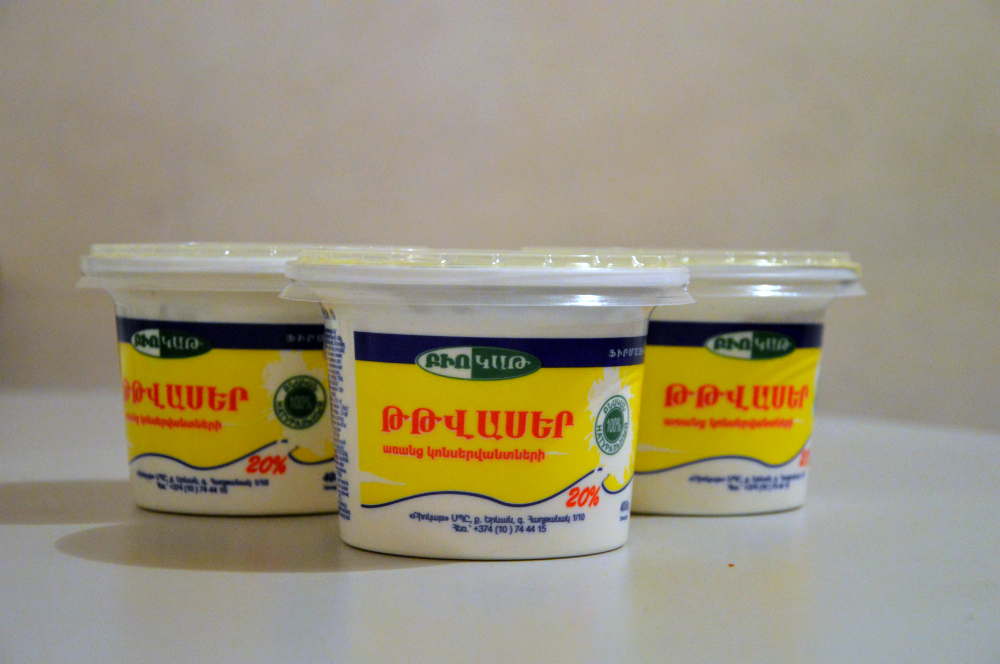
Biokat company’s sour cream is labeled as "100% natural", containing “pure cow's milk cream and sour cream starter", with 20% fat, corresponding to Armenian standards and having an EAC conformity mark.
According to the results of the testing, the sour creams of Biokat are in line with the established norms and are suitable for use in food.
SAMPLE N4
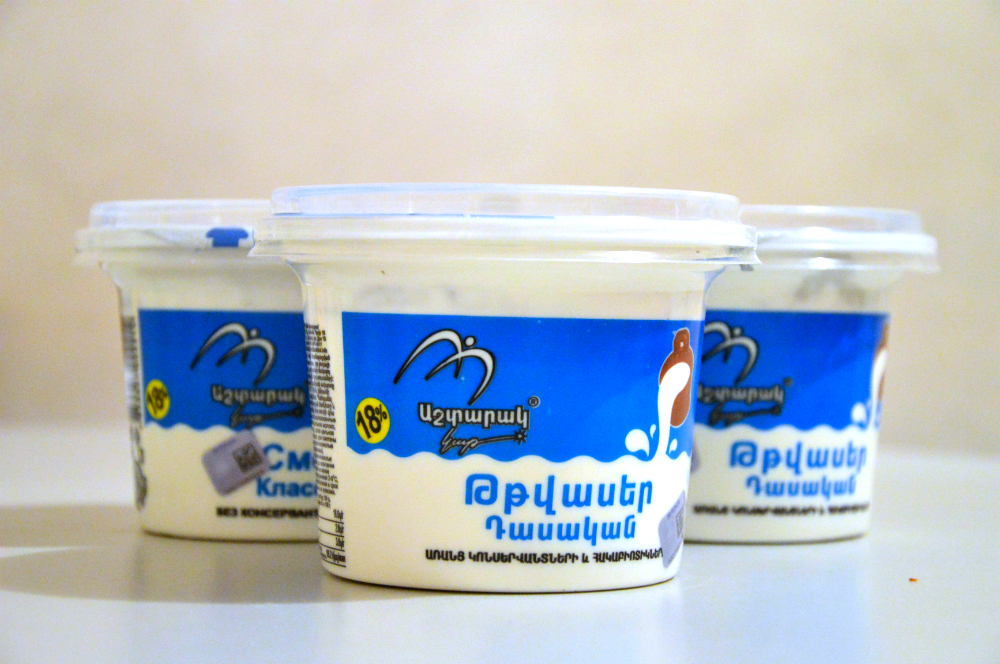
Ashtarak Kat’s sour cream, according to its label, contains "normalized cow's milk, butter, sour cream starter, 18% fat".
The testing showed that the yeast level was 200 CFU/ g, which exceeds the permissible norm by a factor of four.
Yeast is a sanitary indicator and is evidence of non-compliance with hygienic norms during production.
Moreover, Ashtarak Kat's product is not sour cream but a sour cream product, as it contains inadmissible amount of vegetable oil and is considered to be bogus, according to the Food Safety Act.
Thus, it doesn’t comply with the prescribed norms and is unfit for human consumption.
SAMPLE N5
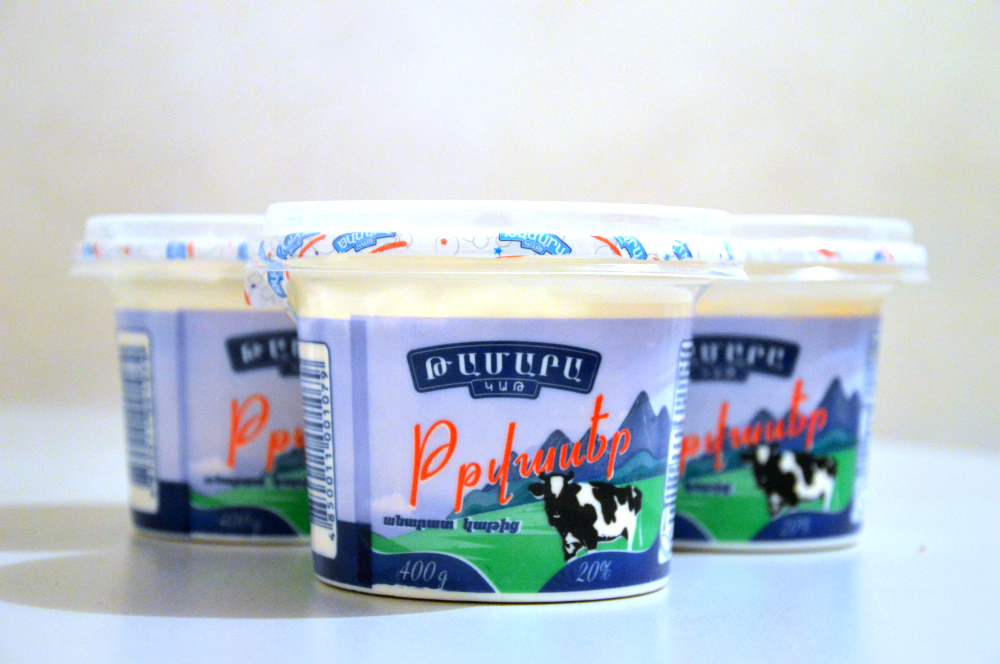
Tamara’s sour cream is labeled as "made from natural milk", containing "whole milk, normalized cream, sweet cream butter, dried fat-free milk, sour cream starter".
Sour cream fat: 20%. It’s said to correspond to Armenian Standards, and it has also an EAC conformity mark.
The testing showed that Tamara sour cream contained antibiotic Levomycetin - 0,0004294 mg/kg (the permissible level is<0,0003 mg/kg). The sale of this antibiotic is restricted in Armenia and it can only be used by a physician’s prescription.
Thus, this sample doesn’t comply with the prescribed norms and is unfit for human consumption.
SAMPLE N6
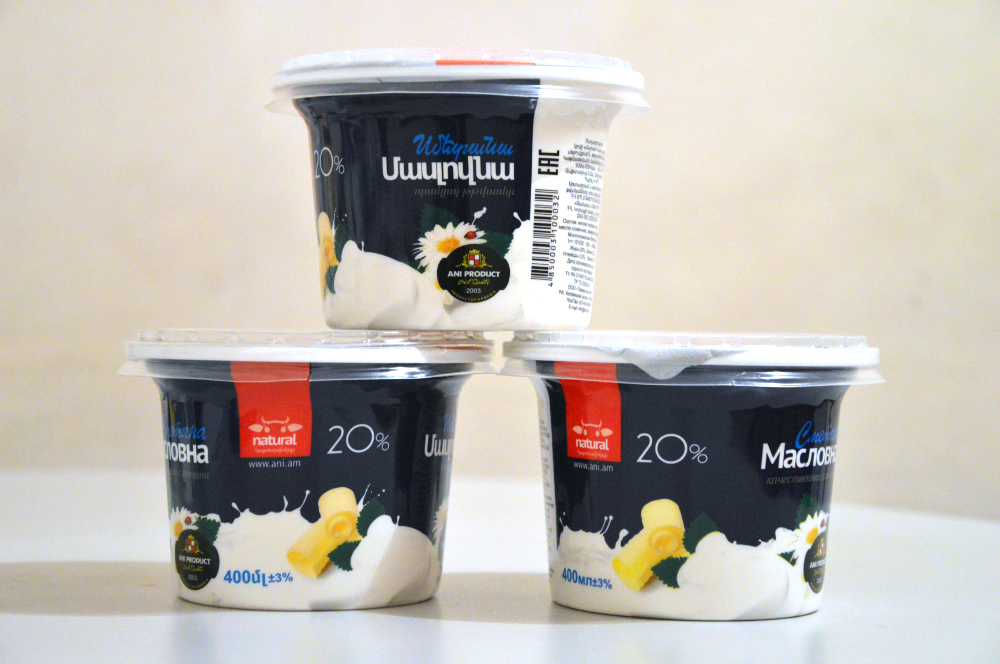
Tamara and Ani company’s “Smetana Maslovna” sour cream is labeled as containing "pure cow's milk, butter cream, sour cream starter", with 20% fat, corresponding to Armenian standards and having an EAC conformity mark.
The testing showed that “Smetana Maslovna” sour cream is in line with the established norms and is suitable for use in food.
SAMPLE N7
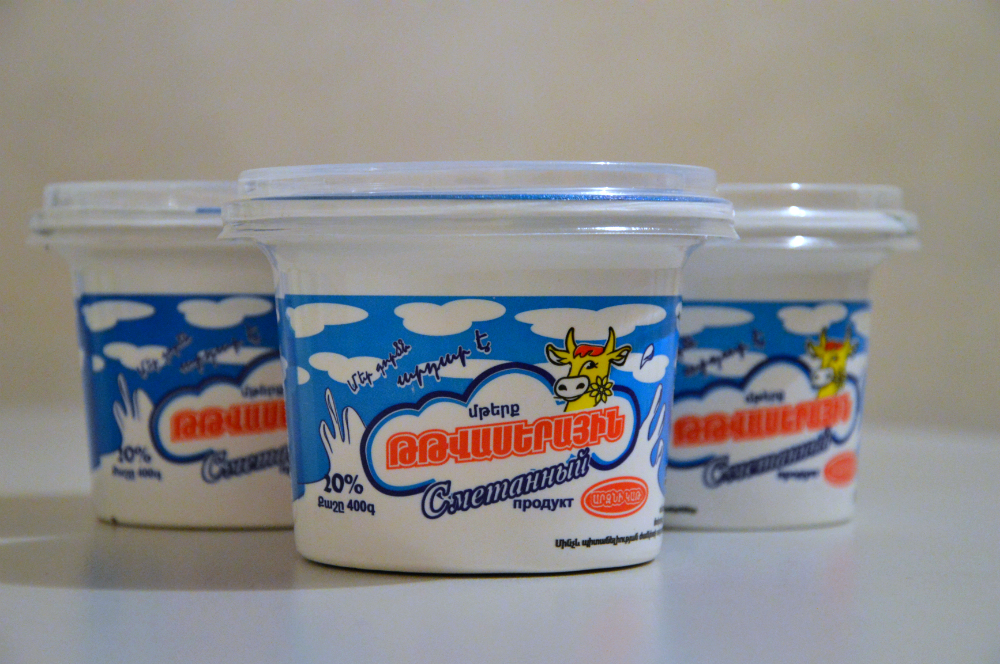
Arzni Pedigree Poultry-Swine-Cattle’s “Arzni Kat” sour cream label says that this is not sour cream, but a sour cream product, which means vegetable oil use is permissible, but it should still be noted on the label.
On the label, however, it’s written that it contains butter (also, pure milk, whole milk, milk fat substitute * (vegetable oil)).
Fat is 20%. It says to be corresponding to Armenian Standards and has an EAC conformity mark.
"Our job is fair," notes the manufacturer of Arzni Kat, while the result of the testing shows that the product contains Escherichia coli bacteria, doesn’t comply with the established norms and is not suitable for use.
SAMPLE N8
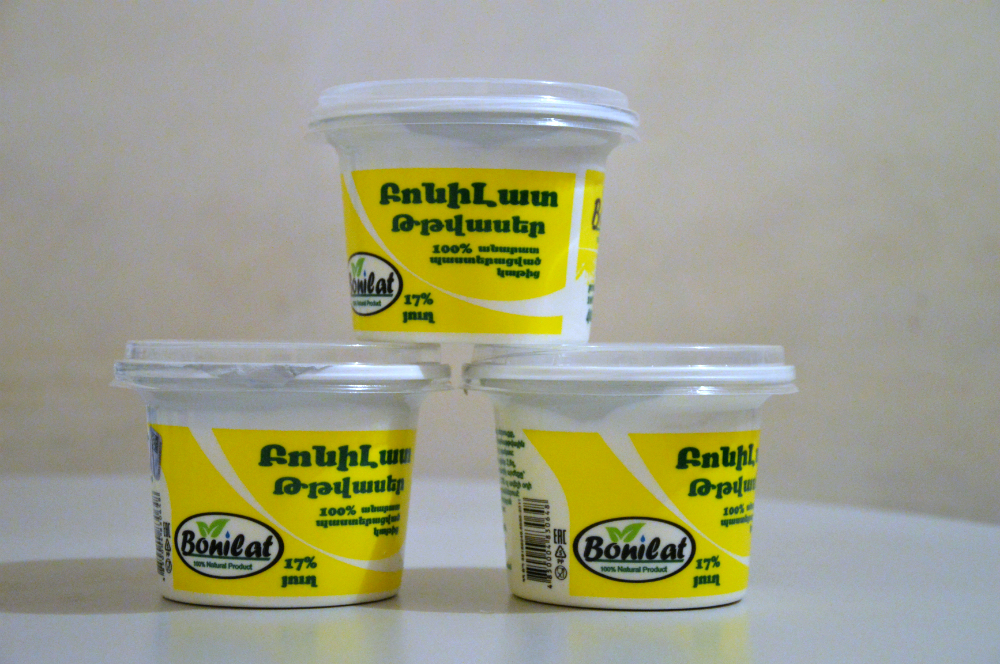
Bonilat’s sour cream is labeled to contain "cow's milk cream, microbial ferment", and have 17% fat.
It says to be corresponding to standards, and has an EAC conformity mark.
The testing revealed that though it’s labeled as “100% natural product", the amount of yeast is 14 times the permissible norm (700 CFU / g).
Thus, it doesn’t comply with the established norms and is not suitable for use.
SAMPLE N9
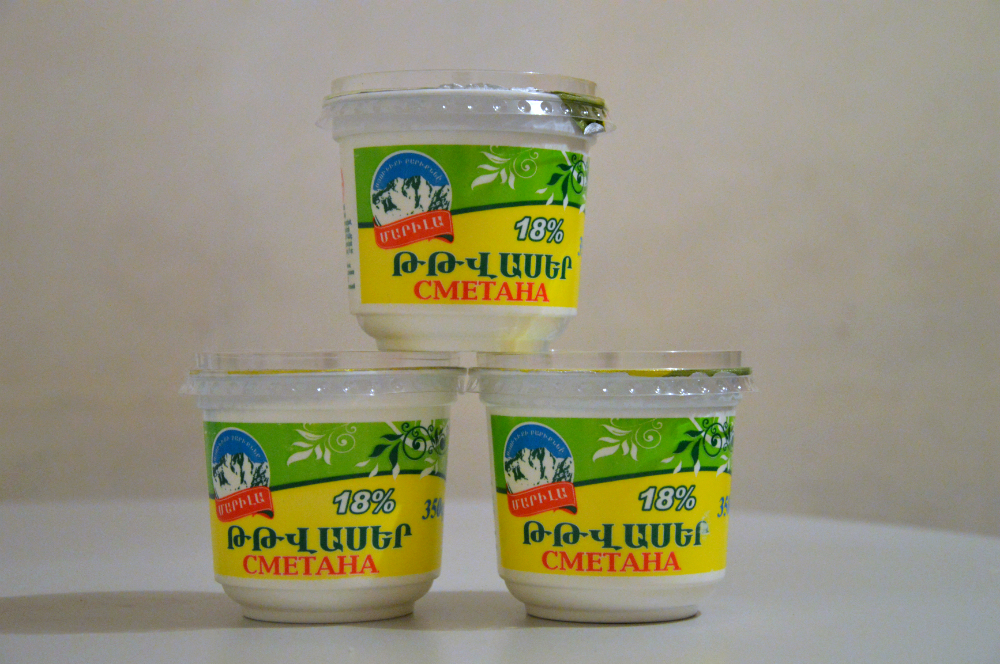
Marila company’s sour cream contains “normalized pasteurized cream, bacterial ferment", fat content -18%.
The label says it’s compliant with the national standards of Armenia, and has an EAC conformity mark.
The testing showed that Marila sour cream corresponds with established norms and is suitable for use.
SAMPLE N10
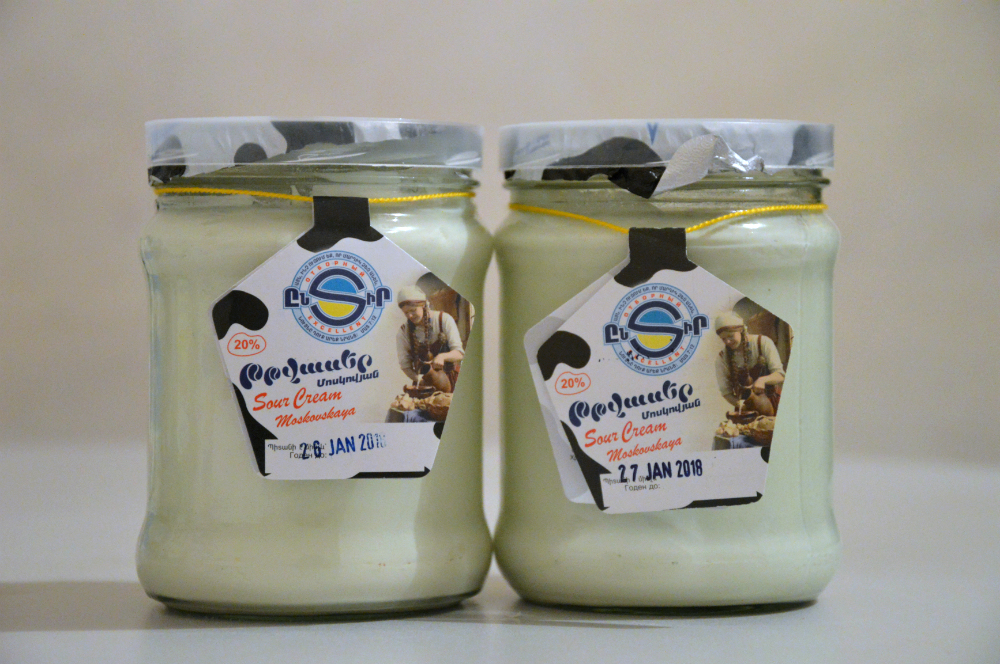
Echmiadzin Kat’s Moskovyan sour cream is labeled to contain "normalized pasteurized milk cream, bacterial ferment", and 20% fat.
It’s the only sample having a label that says it’s corresponding to GOST norms and it also bears EAC conformity mark.
However, the testing showed that this sour cream contained Escherichia coli bacteria, as well as an unacceptable amount of yeast, which exceeds the norm 12 times (600 CFU / g).
Thus, this sample doesn’t comply with the prescribed norms and is unfit for human consumption.
When addressing the State Food Safety Service Head on January 20, Armenian Prime Minister Karen Karapetyan said, “We are obliged to ensure that our citizens who buy sour cream or something else believe that there is a service protecting their interests, and that businesses can not violate the established norms in order to get super-profits or other benefits."
Our testing of sour creams shows that citizens aren’t protected, since only three out of the ten tested samples complied with the norms.
Readers can access the laboratory findings here (in Armenian)
 Videos
Videos Photos
Photos
Comments (2)
Write a comment